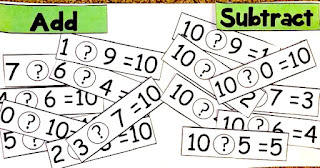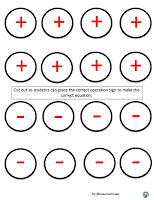Welcome to
my blog post!
Add and
Subtract Facts of 10 Game - Task
Cards
Which Operation Sign Will Make A Correct Equation?
 One of
the objectives I developed
this lesson was to help my students develop a better understanding determining which sign, plus or minus, should go in the number sentence to make a math fact
of 10. Some students would continually mix up when to put in a < and when to place the > symbol in the equality expression.
One of
the objectives I developed
this lesson was to help my students develop a better understanding determining which sign, plus or minus, should go in the number sentence to make a math fact
of 10. Some students would continually mix up when to put in a < and when to place the > symbol in the equality expression.
Check
out the full product in my TPT store, Math Math Magic.
 |
| Materials In Activity |
Depending
on the developmental
level of your students, you may wish to initially review the operation signage,
+ and -
as well as the vocabulary words, Add and Subtract. How can a student tell the
difference, if a language is an issue? Engage the whole class in ‘Math Talk’ discussion
about the signs and the vocabulary.
 |
| Subtraction & Addition Facts of 10 |
Before
you introduce how
to play the game, you may wish to display and discuss the resource anchor chart,
‘Subtraction and Addition Facts to 10,’
Below
are some suggestions
about how to use the product to get you started using the task cards. After
playing with your students, you will think of other fun and interactive ways to
use in your classroom.
 |
| Sorting Categories |
1.
Students place the
task cards face down and then sort them into the correct operational sign
category. (add or subtract)
2. Ask the students to show their
work on the recording sheet.
3.
Children can use
the answer key to self-check or have a partner use the answer key to check
their work.
**Another option is for the student to
use the cutout circle + and – signs and correctly place them on the task card
showing the correct operation. A partner can check their work or by using an
answer key and use the recording sheet if wished.
 |
| Operation Signs + - |
your
math center or as an assessment tool!
Whole-Class
Activity: Option 1
1. Post the Add + and
Subtract - sorting posters in
a convenient area in your room
 |
| Sorting Mats |
2. Deal a task card face down to
each student. There are 22 different cards, so if you have more than 22
students, decide which cards you may wish to duplicate to equal the number of
students.
3. When you give the signal,
students turn over their card and decide which operation, addition (+) or subtraction
(-), makes that 10’s fact task card correct.
4. Students take their card to
the operation area they believe is correct, and place their card under either
the Add or Subtract header set up with the operation signs.
5. When all the cards are placed.
and students are satisfied with their work, a JUDGE or the whole class reflect
to see if all is correct.
**If
you play the activity as partners, you may not need to duplicate any task
cards.
 **Another option is to have any extra
students are the JUDGES on the accuracy of the completed activity.
If they disagree, they can correctly fix the incorrect responses.
**Another option is to have any extra
students are the JUDGES on the accuracy of the completed activity.
If they disagree, they can correctly fix the incorrect responses.
Whole-Class
Activity: Option 2 and 3
 |
| Example of task cards |
Goal: Initially decide if you want students to find
their addition or subtraction related fact partner. Tell the students which
operation they will be using.
 |
| Example of task cards |
1. With his/her dealt card, the
student walks and finds another student that has their addition or subtraction
related fact. You may need to keep reinforcing the game rule!
**Students turn over their card and
mentally have to decide the numbers in that 10’s fact family. Now move around
the room and find the person that is holding the related fact that corresponds
to each other. For example, if you were only focused on addition, the 4+6=10
and the 6+4=10 card students would get together.
2. Next round you could ask for
the subtraction related partners to find each other (10-1=9 and 10-9=1). Be
sure to thoroughly discuss the new rule and answer any questions that arise.
Whole-Class Activity: Option 4 is More Advanced
*This
can become complicated, so be sure your students can move and work as a group according to
your ‘room rules’ expectations and that they fully understand the idea of
related facts and the operation signs.
 |
| Related Family 10, 7, 3 |
1. This option has them finding
and standing with all the family members, both addition and subtraction
facts, that are related fact numbers. (I.e. 7+3=10, 3+7=10, 10-3=7, 10-7=3) Now
there will be a group of 4 together. Ask them to discuss how they know they
belong in the same family. Re-deal the cards and play again! Fun for all!!
I love
the many possibilities
of this product because it can not only be used multiple times throughout the
year but can provide a variety of objectives and developmental work levels for
your students.
Please
follow my blog and the materials found in my store, ‘Make Math Magic.’
Thank you for following my Facebook, where I do post more ideas.

